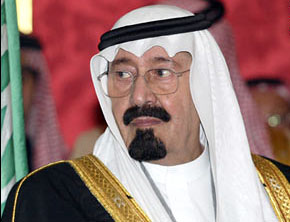GERTZ:
Sea change in the Gulf: Saudis unsure of U.S. intent, turn to Moscow
WASHINGTON -- Over the last two years, the kingdom of Saudi Arabia has been signaling its anxiety at the prospect of an Iran with nuclear weapons eventually dominating the new Shi'ite government of Iraq as the U.S. withdraws its forces over the next two years.
Now the Saudis, in a move that has stunned the West, has decided to make Russia a strategic ally in an effort to counter Iran's dominance of the Gulf.
Saudi Arabia's approach to Russia marks a sea change for the Arab kingdom, which long regarded Moscow as the center of the evil communist empire. But today Riyad sees its real threat in neighboring Iran.
King Abdullah has approved the development of a strategic relationship with the Kremlin that would include cooperation in defense and energy. The pro-Russian policy marks a strategy drafted by Deputy Prime Minister Prince Nayef to outspend Iran in the race for weapons and allies.
The Center for New Politics and Policy asserted that Riyad has ordered hundreds of helicopters, main battle tanks, armored personnel carriers and other military platforms from the Kremlin. In a report, the center said the Saudi decision sought to pressure Moscow to stop major weapons and nuclear sales to Iran.
"As a major arms and nuclear materials supplier to Iran, Russian arms sales to Saudi Arabia afford Moscow powerful leverage in the Persian Gulf at a time when American and Western European influence is declining," the report, titled "Saudi Arabia's Foreign Policy Gamble and the Iranian Nuclear Problem," said.
Authored by senior fellow Webster Brooks, the report said Saudi Arabia agreed to a $4 billion weapons deal with the Kremlin in 2007. The deal was said to have included the Russian sale of 150 T-90 main battle tanks, 100 Mi-17 helicopters, hundreds of BMP-3 infantry combat vehicles and 20 BVIC air defense systems.
"Abdullah's shift to allow the Russians arms sales shocked the United States and Western Europe," the report said.
Brooks said Russian Prime Minister Vladimir Putin also offered Moscow's support for Saudi strategic programs. He cited Saudi plans to build nuclear reactors, satellites and expand space cooperation.

King Abdullah has approved the development of a strategic relationship with the Kremlin that would include cooperation in defense and energy Telegraph
"Speculation that the Saudi arms deal with Moscow included a proviso that Russia would oppose Iran's nuclear arms program has not materialized," the report said.
The report said Saudi Arabia would continue to procure U.S. military platforms. Riyad also plans to install an $8 billion border security system as well as procure maritime security vessels, unmanned aerial vehicles, surveillance aircraft and helicopters as part of a U.S.-sponsored Gulf Cooperation Council security regime.
"But the Moscow agreement was a serious warning that Riyad is no longer marching in lockstep with the U.S., especially when its national security interests are at state," the report said.
"Similarly, the debate within the House of Saud about President Obama's response to the Iranian nuclear threat has raised the issue of Riyad pursuing a nuclear path."
The report said Saudi Arabia has been threatened by Iran from several directions. Brooks cited the dominance of Iranian-backed Shi'ite militias along the Iraqi border with Saudi Arabia as well as the revolt by Iranian-backed Shi'ites in neighboring Yemen.
"Thus, Saudi Arabia's foreign policy continues to undergo profound change that will require more accommodations to Teheran, greater independence from the United States, closer ties to Russia and an unprecedented military buildup that could include a Saudi nuclear program," the report said.
In May 2007, U.S. officials said Abdullah had repeatedly told visiting Americans that he was dismayed over the Bush administration's support for pro-Shi'ite polices in Iraq. Abdullah was quoted as saying that U.S. assistance to the Shi'ite-dominated government of Iraqi Prime Minister Nouri Al Maliki could lead to Teheran's takeover of Iraq and the Gulf region.
"He [Abdullah] also told me that he had severe misgivings about the Maliki government and the reasons for that," then U.S. Central Command chief Adm. William Fallon said. "He felt, in his words, that there was a 'significant linkage to Iran.' He was concerned about Iranian influence on the Maliki government."
Officials said Abdullah's dismay over U.S. policy prompted a decision by President George Bush to send his vice president to Saudi Arabia to assure Abdullah of the U.S. commitment to Gulf security.
The following year, in July 2008, Vice President Dick Cheney paid another visit to Saudi Arabia to talk oil and reassure an uneasy king.
As the July 9, 2008 edition of Geostrategy-Direct reported at the time,
At issue is U.S. credibility in a region increasingly dominated by Iran which, like North Korea in East Asia, is continuing to develop WMD programs while spreading its influence in Syria, Lebanon, Iraq and the Gulf with no decisive response by the West.
Abdullah and the royal family have been increasingly alarmed over the rise of Iran throughout the Gulf and have concluded that Teheran was fomenting Shi'ite populations in its own and the neighboring states of Bahrain and Kuwait.
Addressing the University of Jordan's Strategic Studies Center on April 4, Saudi National Security Advisor Prince Turki Al Faisal, a former intelligence chief as well as Saudi ambassador to Britain and the United States, blamed Washington for Iran's expansion.
Turki, who is also the brother of Saudi Foreign Minister Prince Saud, said Iran was preparing to take over Iraq. Turki said the United States was facilitating the Iranian takeover as part of an American military withdrawal from Iraq.
